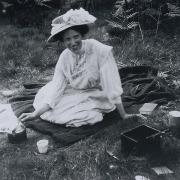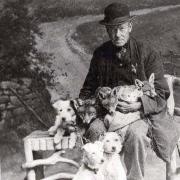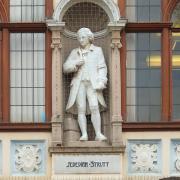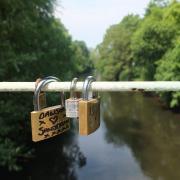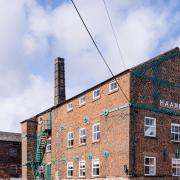Successful entrepeneur Deborah Fern has used her fortune to help worthy causes and restore Stancliffe Hall in Darley Dale to its former glory. Mike Smith went to visit her at home
Twenty-two years ago, Deborah Fern was living in a rented two-up, two-down house in Derby. Her marriage had broken up, she had lost her job after suffering injuries in a car crash and she was struggling to feed and clothe her two young daughters. With just �4 in her pocket and a business plan in her head, she was determined to change her circumstances. Today, she is a multi-millionaire who has been honoured with an OBE for her philanthropy and has fulfilled her childhood dream of ‘living in a big country house surrounded by wonderful trees and approached by a long sweeping drive’.
Stancliffe Hall stands high above Darley Dale and commands panoramic views across the Derwent Valley to Riber Castle, romantically situated on a hill-top as though it were a folly erected as an eye-catcher to enhance the prospect from the hall’s 50-acre estate. The silence is broken only by occasional cries emitted by birds as they strut around the grounds. Deborah and her partner, Brian, have lived in this paradise since 2003 – although, as I would discover, the hall itself was more like ‘paradise lost’ when they first moved in.
I met the couple on the terrace of their magnificent mansion, where we took afternoon tea and I teased out the stories behind two remarkable changes in fortune: Deborah’s journey from rags-to-riches and the restoration of Stancliffe Hall to its former glory. Deborah began the tale by telling me about her childhood in Alvaston. She said: ‘My parents always believed that ‘you can’t have it if you don’t earn it.’ My mother set up her own hairdressing business, my father was a pub landlord and, from the age of thirteen, I sold jewellery in the Eagle Centre. I left school at sixteen, not only because I was unhappy there, but also because I wanted to get a job and earn money.’
Deborah found work as a clerical assistant at Rolls-Royce in Derby and was sent on day-release to study for an ONC and an HNC in Business Studies. She went on to take the Institute of Chartered Secretaries’ examinations and eventually became an assistant accountant, but her fortunes began to change when she crashed her car in Tenerife. She said, ‘At first, I seemed to have no physical injuries, but a few weeks after the accident, I suddenly found that I couldn’t walk. I was unable to work for a short time and, to make matters worse, I was then laid-off at Rolls-Royce – I was devastated.’
Deborah may have been devastated, but she was certainly not defeated, because she has always been incredibly industrious and resourceful, whatever her circumstances. She has owned a catering company, cleaned offices in the morning, sold pans at house parties in the evening and run a debt-collection agency during the day. As she said, ‘You name it, I’ve done it!’
However, Deborah’s most significant career move came in the period when she was a single mother in desperate need of a steady income to support and secure a future for her two young daughters. At this point, she managed to land a job with the Derbyshire Enterprise Board as an adviser to unemployed people who were trying to set up in business. Quickly realising that there was an enormous need to help people in this way, she decided to take the bold step of drawing up a business plan and persuading her bank manager to loan her �5,000 so that she could set up her own company, which would have a mission to help people into employment and business. And so it was that Fernley Business Services was born.
On her very first day as a businesswoman, Deborah obtained a contract under the New Start Enterprise Scheme to write and deliver a programme to help the long-term unemployed into work. Thanks to her determination not to give up on anyone who came to her for help and her willingness to improve her clients’ practical and literary skills, and even to provide them with clothes for job interviews, she made a great success of her company. Just fifteen years after setting up, she was employing 450 people and helping up to 25,000 unemployed people per year. Her message to them was: ‘If I can do it, so can you’.
In 2006, Deborah sold her company for �15.5 million, began studying for a degree in English and Creative Writing, gave over a million pounds to the NSPCC, raised huge sums for other charities and put a considerable part of her fortune into the restoration of Stancliffe Hall, which she had bought three years earlier. Brian, who had worked as a Royal Engineer and as a Defence Contractor, gave up his job so that he could work with Deborah to restore the hall and turn it into a luxury home, as well as a venue for corporate events, business-training sessions and weddings. After working long hours over a period of seven years, the couple have completed their ambitious project to perfection.
Deborah is not the first entrepreneur and philanthropist to live in the hall, which was built in 1670 for the Columbell family, Lords of Darley from 1373 to 1721. Sir Joseph Whitworth, the great inventor and engineer, bought Stancliffe in 1854 and lived there with his second wife, Lady Louisa, from 1871 until his death in 1887. Lady Louisa continued to live in the hall for the rest of her days and ensured that part of her husband’s fortune was used to establish a splendid institute and a hospital for the people of Darley Dale. After her death in 1896, the hall was leased for use as a school to Rev, Ernest Owen, who was said by
When Deborah and Brian acquired the hall, the school had been closed for two years, but various unsightly prefabricated classrooms remained on the site and the front approach to the house was overshadowed by an Edwardian tower block that had been added when the house was used as a school. The winter garden, created by Sir Joseph, had disappeared and various decorative features inside the house, some fashioned by the celebrated designer Augustus Pugin, had been masked or damaged.
Explaining the extent of the restoration project, Brian said: ‘We demolished the 20th-century prefabs, took the top storey off the Edwardian tower block, known affectionately as "Colditz", converted one part of the school building into a conference centre and another into boutique-standard accommodation for people attending events and weddings, adapted the school chapel as a venue for wedding ceremonies, renovated the chateau-style Victorian additions designed by EM Barry and T Roger Smith, converted the school kitchen into a billiard room, installed a spa, added a new conservatory in the style of the one that stood in the winter garden and restored the internal fittings in the house. The entire project cost �6 million and lots of sweat and toil.’
When Brian and Deborah took me on a tour of the house, which had no fewer than 100 rooms when it was used as a school, I was struck, not only by the care that has gone into restoring the Victorian and Edwardian details, but also by the tastefulness of all the decorations and furnishings in both the public and the private quarters of the house. I noted the mosaic floor that has been re-laid in the conservatory after being discovered under decking which covered the old winter garden; I admired Deborah’s wonderfully eclectic collection of paintings; I experienced the awe felt by guests when they are received into the ‘Stone Court’, now beautifully restored and enhanced by a delightful sculpture of a dancer; and I marvelled at the mansion’s pi�ce de r�sistance, a painstakingly-restored Victorian pine staircase.
In 2008, Deborah was awarded the OBE for her services to charity and business. She continues to give generously and to raise huge sums for charity, and her restored mansion promises to be another highly successful business venture, as well as a wonderful ‘home sweet home’. When Sir Joseph Whitworth lived at Stancliffe Hall, he inserted a stained glass window bearing the letter ‘W’. His window has been restored, but Deborah Fern has added her own version, which is engraved with the letter ‘F’ to reflect the realisation of her childhood dream of living in a big country house surrounded by wonderful trees and approached by a long a sweeping drive.
Corporate, wedding and spa brochures for Stancliffe Hall can be accessed on www.stancliffehall.co.uk. To make bookings for the hall or for accommodation at Yew Tree Cottage (a holiday let in the grounds) email enquiries@stancliffehall.co.uk or ring 01629 736 956.
Information about Shoot Lifestyle photographers can be found on www.shoot-lifestyle.co.uk





